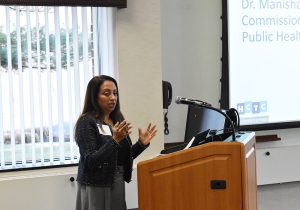The Connecticut Hospital Association (CHA) has released a new report that demonstrates Connecticut hospitals and health systems statewide continue to face extraordinary economic headwinds exceeding regional and national trends. The 2024 CHA Hospital Financial Health Report is supported by an independent analysis from Kaufman Hall, a national healthcare economics firm.
The Kaufman Hall analysis details how Connecticut hospital expenses are rising at alarming rates that outpace national growth and increases in the Northeast/Mid-Atlantic region; Connecticut hospitals are collectively operating at a loss; and government payer underpayment is contributing to and exacerbating these financial pressures.
“We are raising awareness about these challenges ahead of the 2025 Legislative Session to inform our continued collaboration with state leaders and partners to ensure a sustainable and viable healthcare delivery system for our state’s future,” said Jennifer Jackson, CEO, CHA. “More must be done to preserve the world-class, compassionate, accessible care for which Connecticut is known. Policymakers understand the importance of a sustainable and strong healthcare system, and we need to confront these realities head-on to develop the right solutions for all patients and communities.”
On Wednesday, December 18, Connecticut hospital and health system leaders joined CHA for a press conference to discuss details of the analysis and accompanying report. Speakers provided critical perspective, illustrating day-to-day, real-time repercussions of operational and financial strains.
Dan DeBarba, CFO, Nuvance Health, described the ripple effects of massive Medicaid and Medicare reimbursement shortfalls — amounting to $1.43 billion and $1.23 billion in losses in 2023 statewide, respectively.
“Hospitals, we take all comers. We care for patients. We’re the last line of defense, regardless of their ability to pay, regardless of payer status,” DeBarba said, noting that hospitals are paid only 62 cents on the dollar to provide care to Medicaid beneficiaries and only 74 cents on the dollar for Medicare patients. As a result, DeBarba explained, hospitals are forced to bridge the gap, and costs shift to commercial payers. Insufficient Medicaid reimbursement also jeopardizes underserved individuals’ access to care, including behavioral healthcare, placing greater burdens on hospitals as other providers may choose not to accept Medicaid patients.
At the same time, private insurers, including Medicare Advantage plans, may delay, withhold, or deny payments for medically necessary care. As Caryl Ryan, COO, CNO, UConn John Dempsey Hospital, described, these administrative roadblocks are not only costly for providers but create barriers to timely care in appropriate settings for patients, backlogging emergency departments. Ryan also highlighted that hospitals are nimble and always prepared for major disasters, adapting to overcome significant challenges.
“We are constantly pivoting priorities related to patient census ED throughput to include behavioral health needs, particularly within the adolescent population, retention and recruitment of workforce, medication shortages, and supply chain issues,” as exemplified by hospitals’ and health systems’ response to the ongoing nationwide intravenous (IV) solution shortage triggered by Hurricane Helene, Ryan said.
Pamela Sutton-Wallace, Yale New Haven Health president, emphasized it is the responsibility of “hospitals and health systems to take care of individual patients, but we feel equally committed, as oftentimes being anchor institutions in our neighborhoods, of taking care of the larger community.”
Sutton-Wallace explained that hospitals are partnering with local higher education institutions to forge pathways into healthcare careers, they are collectively the largest employer in Connecticut, they are fueling technological innovation, and they are addressing social drivers of health like housing stability and food security.
“We are fiercely committed to health equity,” she said.
In conclusion, Jackson underscored that increasing Medicaid reimbursement could help address the financial pressure on hospitals by more appropriately covering the cost of care. Reimagining the Medicaid program to invest in local communities, she added, has the potential to benefit Connecticut residents over the long term. She also stressed the importance of continuous efforts to recruit and retain the healthcare workforce and address burdensome administrative barriers to care through collaboration with all stakeholders at the table.
Click here to watch the full press conference.
Click here for more information on the financial pressures impacting Connecticut’s hospitals and health systems.




